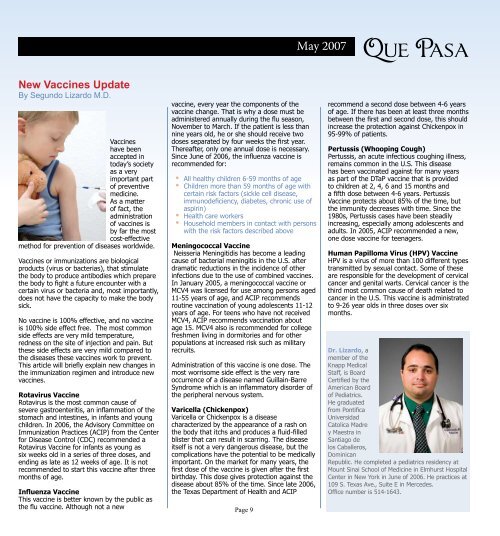May 2007 - Knapp Medical Center
May 2007 - Knapp Medical Center
May 2007 - Knapp Medical Center
You also want an ePaper? Increase the reach of your titles
YUMPU automatically turns print PDFs into web optimized ePapers that Google loves.
<strong>May</strong> <strong>2007</strong><br />
Que Pasa<br />
New Vaccines Update<br />
By Segundo Lizardo M.D.<br />
Vaccines<br />
have been<br />
accepted in<br />
today’s society<br />
as a very<br />
important part<br />
of preventive<br />
medicine.<br />
As a matter<br />
of fact, the<br />
administration<br />
of vaccines is<br />
by far the most<br />
cost-effective<br />
method for prevention of diseases worldwide.<br />
Vaccines or immunizations are biological<br />
products (virus or bacterias), that stimulate<br />
the body to produce antibodies which prepare<br />
the body to fight a future encounter with a<br />
certain virus or bacteria and, most importantly,<br />
does not have the capacity to make the body<br />
sick.<br />
No vaccine is 100% effective, and no vaccine<br />
is 100% side effect free. The most common<br />
side effects are very mild temperature,<br />
redness on the site of injection and pain. But<br />
these side effects are very mild compared to<br />
the diseases these vaccines work to prevent.<br />
This article will briefly explain new changes in<br />
the immunization regimen and introduce new<br />
vaccines.<br />
Rotavirus Vaccine<br />
Rotavirus is the most common cause of<br />
severe gastroenteritis, an inflammation of the<br />
stomach and intestines, in infants and young<br />
children. In 2006, the Advisory Committee on<br />
Immunization Practices (ACIP) from the <strong>Center</strong><br />
for Disease Control (CDC) recommended a<br />
Rotavirus Vaccine for infants as young as<br />
six weeks old in a series of three doses, and<br />
ending as late as 12 weeks of age. It is not<br />
recommended to start this vaccine after three<br />
months of age.<br />
Influenza Vaccine<br />
This vaccine is better known by the public as<br />
the flu vaccine. Although not a new<br />
vaccine, every year the components of the<br />
vaccine change. That is why a dose must be<br />
administered annually during the flu season,<br />
November to March. If the patient is less than<br />
nine years old, he or she should receive two<br />
doses separated by four weeks the first year.<br />
Thereafter, only one annual dose is necessary.<br />
Since June of 2006, the influenza vaccine is<br />
recommended for:<br />
All healthy children 6-59 months of age<br />
Children more than 59 months of age with<br />
certain risk factors (sickle cell disease,<br />
immunodeficiency, diabetes, chronic use of<br />
aspirin)<br />
Health care workers<br />
Household members in contact with persons<br />
with the risk factors described above<br />
Meningococcal Vaccine<br />
Neisseria Meningitidis has become a leading<br />
cause of bacterial meningitis in the U.S. after<br />
dramatic reductions in the incidence of other<br />
infections due to the use of combined vaccines.<br />
In January 2005, a meningococcal vaccine or<br />
MCV4 was licensed for use among persons aged<br />
11-55 years of age, and ACIP recommends<br />
routine vaccination of young adolescents 11-12<br />
years of age. For teens who have not received<br />
MCV4, ACIP recommends vaccination about<br />
age 15. MCV4 also is recommended for college<br />
freshmen living in dormitories and for other<br />
populations at increased risk such as military<br />
recruits.<br />
Administration of this vaccine is one dose. The<br />
most worrisome side effect is the very rare<br />
occurrence of a disease named Guillain-Barre<br />
Syndrome which is an inflammatory disorder of<br />
the peripheral nervous system.<br />
Varicella (Chickenpox)<br />
Varicella or Chickenpox is a disease<br />
characterized by the appearance of a rash on<br />
the body that itchs and produces a fluid-filled<br />
blister that can result in scarring. The disease<br />
itself is not a very dangerous disease, but the<br />
complications have the potential to be medically<br />
important. On the market for many years, the<br />
first dose of the vaccine is given after the first<br />
birthday. This dose gives protection against the<br />
disease about 85% of the time. Since late 2006,<br />
the Texas Department of Health and ACIP<br />
Page 9<br />
recommend a second dose between 4-6 years<br />
of age. If there has been at least three months<br />
between the first and second dose, this should<br />
increase the protection against Chickenpox in<br />
95-99% of patients.<br />
Pertussis (Whooping Cough)<br />
Pertussis, an acute infectious coughing illness,<br />
remains common in the U.S. This disease<br />
has been vaccinated against for many years<br />
as part of the DTaP vaccine that is provided<br />
to children at 2, 4, 6 and 15 months and<br />
a fifth dose between 4-6 years. Pertussis<br />
Vaccine protects about 85% of the time, but<br />
the immunity decreases with time. Since the<br />
1980s, Pertussis cases have been steadily<br />
increasing, especially among adolescents and<br />
adults. In 2005, ACIP recommended a new,<br />
one dose vaccine for teenagers.<br />
Human Papilloma Virus (HPV) Vaccine<br />
HPV is a virus of more than 100 different types<br />
transmitted by sexual contact. Some of these<br />
are responsible for the development of cervical<br />
cancer and genital warts. Cervical cancer is the<br />
third most common cause of death related to<br />
cancer in the U.S. This vaccine is administrated<br />
to 9-26 year olds in three doses over six<br />
months.<br />
Dr. Lizardo, a<br />
member of the<br />
<strong>Knapp</strong> <strong>Medical</strong><br />
Staff, is Board<br />
Certified by the<br />
American Board<br />
of Pediatrics.<br />
He graduated<br />
from Pontifica<br />
Universidad<br />
Catolica Madre<br />
y Maestra in<br />
Santiago de<br />
los Caballeros,<br />
Dominican<br />
Republic. He completed a pediatrics residency at<br />
Mount Sinai School of Medicine in Elmhurst Hospital<br />
<strong>Center</strong> in New York in June of 2006. He practices at<br />
109 S. Texas Ave., Suite E in Mercedes.<br />
Office number is 514-1643.





